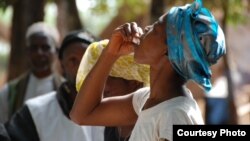Cholera has again reared its ugly head in Southern Africa, infecting nearly 6,000 people in Mozambique, Malawi and now Zimbabwe. Heavy rains have been cited as the main culprit of this outbreak, but poor sanitation continues to plague this region, and human rights advocates say that is a failure of leadership.
The record-setting rain that has washed over the nations of Malawi, Mozambique, Madagascar and Zimbabwe has brought back a disease that plagues Southern Africa: cholera.
The disease is caused by contact with polluted water and causes diarrhea, vomiting and severe dehydration. It can kill within hours if not properly treated. The United Nations' coordination agency, OCHA, said Mozambique, Malawi and Zimbabwe have seen nearly 6,000 cholera cases since January.
Outbreak chronology
Johannesburg-based OCHA reporting officer Hein Zeelie traced the chronology of the outbreak.
“What we are seeing now is a very big outbreak in northern Mozambique that spilled over into southern Malawi, which is also dealing with a very severe flooding situation," said Zeelie. "And we are starting to have cases being reported in Zimbabwe, which is of great concern as that was the country that was most affected during the 2008 to 2009 outbreak that killed over 4,000 people.”
That deadly outbreak is still clear in the memories of many Zimbabweans, as noted in an editorial this weekend in the state-run Herald newspaper.
“The last thing we need,” the editorial board wrote, “is a repetition of that. The costs in human lives, medication and national brand are too high. ... Such outbreaks reinforce the global misconception of Africa as a homogenous continent defined by deadly diseases and gross ignorance of basic hygiene.”
But the outbreak is hardly breaking news, said Dewa Mavhinga, a senior Southern Africa researcher for Human Rights Watch. Mavhinga noted that HRW documented stunningly dirty and unsafe conditions in the sewage and water systems of Harare in a late 2013 report.
Mavhinga said the situation is worse in rural areas, where many residents can not access clean drinking water.
“So what is happening now is really quite sad and embarrassing for the government of Zimbabwe. It shows a lack of preparedness, it shows a lack of prioritization in terms of putting sufficient resources towards the health and sanitation situation in the country,” said Mavhinga.
Root causes
Zeelie said the heavy rains do provoke seasonal outbreaks of cholera in this region. The African continent usually reports the bulk of the world’s cholera cases.
“But it is, fundamentally, it is really about development issues, specifically water and sanitation. For example, in the most affected province in Mozambique, which is Tete province, you are looking at less than half of people having access to clean water, and less than a quarter having access to improved sanitation,” said Zeelie.
Although cholera is relatively easy to treat, however, its root causes are not such a cheap fix: in one Mozambican province alone, the OCHA-managed Central Emergency Response Fund has put in nearly $750,000 to manage the outbreak and make sanitation improvements.
Mavhinga said access to clean water is a human right, though, and governments need to do more.
“The bottom line is the same: that there is not enough prioritization for sanitation and health, not enough resources from these governments are being put towards health and preventing these diseases," said Mavhinga. "So there is an urgent need of the governments of Mozambique, of Malawi, of Zimbabwe, to prioritize the health of their citizens and ensure the capping of this outbreak, otherwise, it will engulf the entire region.”
The United Nations says the current outbreak has killed 45 people.




